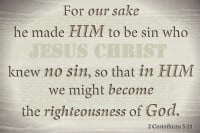⏱️ Estimated Reading Time: 5 min read
I am so very thankful for the recent resurgence among the “Young, Restless, and Reformed”—as Collin Hanson with the Gospel Coalition would call it—who preach the gospel and it’s core doctrine of justification by faith alone week by week. Sadly, the American church often misses this core doctrine..
Luther called the doctrine of justification by faith alone “the head and cornerstone” and explained that “without it the church of God cannot exist for one hour?”[1] He writes in his commentary on the book of Romans that “all men are sinners and in need of [God’s] righteousness.”[2] It was not simply a general “salvation,” but God’s righteousness that provided the foundation for salvation. Calvin wrote, “Wherever the knowledge of [justification] is taken away…the hope of salvation is utterly overthrown.”[3]
Indeed, sola fide was the battle cry of the Reformation and remains the bond between the various branches and denominations of the Protestant church. Certainly this doctrine is not just central to the Christian life or the hope of the church; it should also central to teaching and preaching.
So what do we mean when we say “justification by faith alone?” What is the historical, Reformed, and biblical understanding? The Westminster Shorter Catechism states: “Justification is an act of God’s free grace wherein he pardoneth all our sins, and accepteth us a righteous in his sight, only for the righteousness of Christ imputed to us, and received by faith alone.”[4]
Justification is the declaration of “not guilty” or “righteous” of a believer in Christ based on the imputation of the believer’s sin to Christ and Christ’s righteousness to the believer. This is called double imputation and is the foundation of God’s pardoning and declarative act.
Justification in Paul’s letters, expounded by the Continental Reformers and Post-Reformation Puritans, is chiefly a forensic term.[5] That is, it is understood in the context of law, guilt, grace, and pardon. The current attack on the doctrine is over this basic belief and insists that justification has more to do with a process of staying in the covenant community of God’s people than with God’s one-time declarative act.[6]
The “great exchange” of the gospel is our sin imputed (or credited) to Christ and his righteousness to us. Richard Gaffin notes, “Justification in Paul is essentially, primarily soteriological. It is a ‘transfer’ term describing what takes place in an individual’s transition from wrath to grace.”[7] He goes on to build the relationship between our union with Christ by faith and the doctrine of justification: “In union with Christ, his righteousness is the ground of my being justified. That is, in my justification his righteousness becomes my righteousness. This…is to be at the notion of imputation. His righteousness is reckoned as mine.”[8]
As the Apostle Paul writes in 2 Corinthians 5:21, “For our sake he made him to be sin who knew no sin, so that in him we might become the righteousness of God.” It is this imputed alien righteousness that is missing in our current, post-modern preaching and teaching. The present challenge to justification “obscures half of Christ’s glory in the work of justification…it denies the imputation of Christ’s righteousness.”[9]
Paul makes the case in Romans 4 that the righteousness “credited” to our account is received by faith and not “works of the law.” He makes the same argument in Philippians 3:9, where he writes that righteousness comes “through faith in Christ.” Moreover, it is this ideology and belief that Jesus attacks throughout the gospels, predominately recognized among the Pharisees and “teachers of the law.”
If we don’t preach justification, we don’t preach the gospel of Jesus Christ. To be sure, justification is the core of the gospel, the “article on which the church stands for falls,”[10] and the only hope for guilty sinners. It is the means by which we lay down our attempts to justify ourselves and trust in the sufficiency of Christ.
I am grateful for the recent conscientious reaffirmation of the doctrine of justification. Let us thank God for counting us “righteous” in his sight based on the merits of his Son and our Lord, Jesus Christ.
[1] Martin Luther, quoted in John Piper, Brothers, We are Not Professionals (Nashville: Broadman & Holman Publishers, 2002), 17.
[2] Martin Luther, Commentary on Romans (Grand Rapids: Kregal Publications, 1976), 78.
[3] John Calvin, quoted in Brothers, We are Not Professionals by John Piper, 17.
[4] Q. 33.
[5] R. C. Sproul, Justified by Faith Alone (Wheaton: Crossway Books, 1999), 12.
[6] This is one of the over-arching premises of the NPP.
[7] Richard B. Gaffin, Jr., By Faith, Not by Sight: Paul and the Order of Salvation (Waynesboro, GA: Paternoster, 2006), 45.
[8] Ibid., 51-52.
[9] John Piper, Counted Righteous in Christ: Should We Abandon the Imputation of Christ’s Righteousness (Wheaton: Crossway Books, 2002), 35.
[10] Martin Luther, XV Psalmos graduum 1532-33; WA 40/III.352.3.




